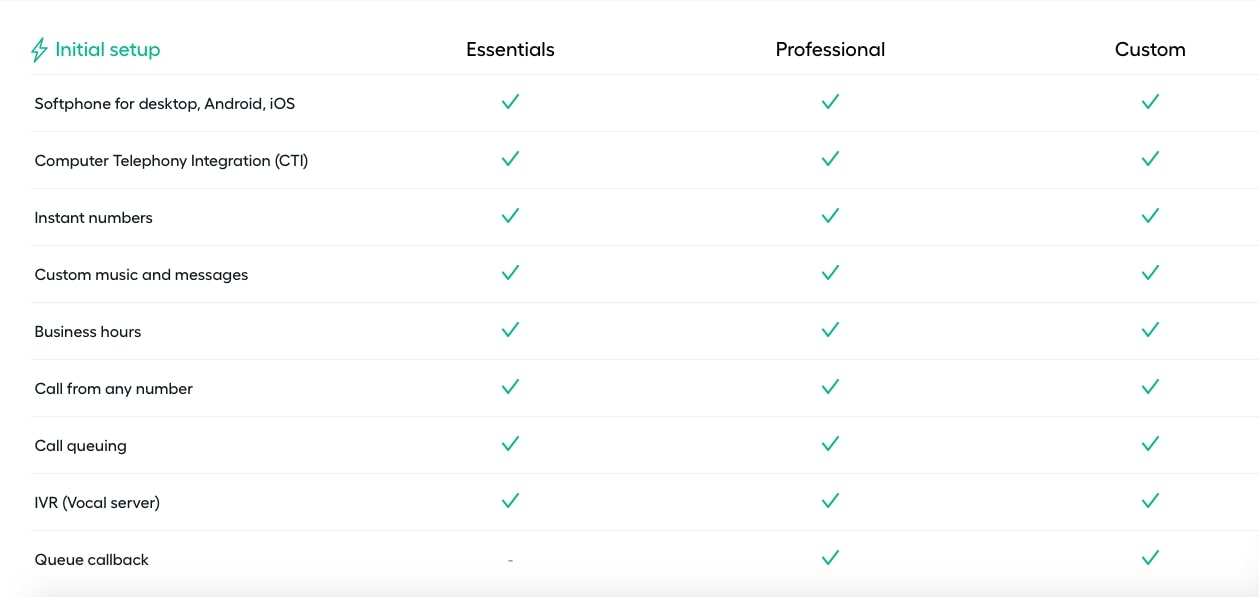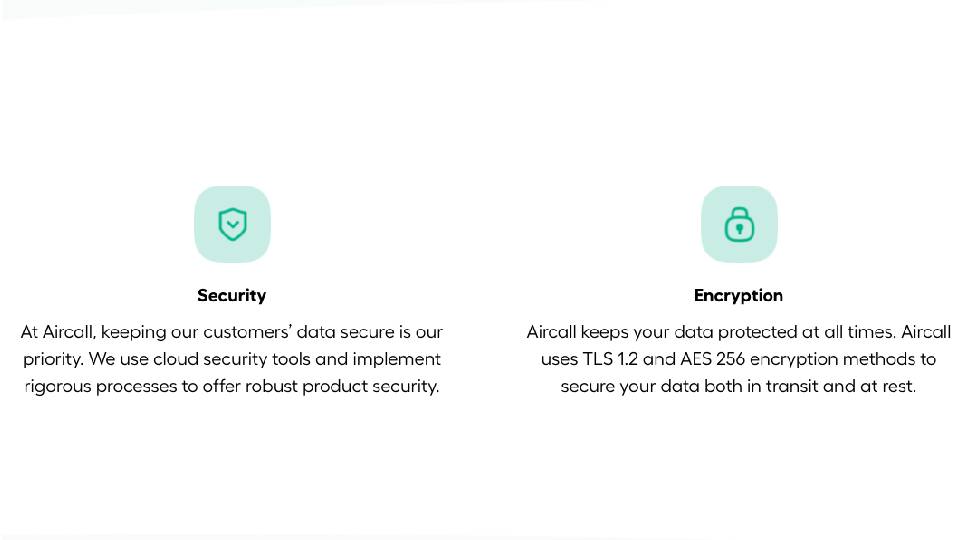Aircall VoIP review
One of the best VoIP services to consider in 2020, Aircall offers a slick and simple approach to handling business calls. Although designed for customer management teams, the software can be used by a variety of professionals looking to start conversations anywhere in the world.
This is our all-in-one roundup looking at the Aircall VoIP phone service. On this page, after our brief intro, you’ll find
(a) an evaluation of the various plans and pricing
(b) an overview of the level of the Aircall features
(c) our take on the Aircall interface
(d) an examination of the support on offer
(e) a review of Aircall's security credentials
(f) a comparison of how it fares against the market competition
You can jump to the review section that interests you most by clicking on the links in the bar at the top of this page, but bear in mind that this article is really designed to be read all the way through, as businesses will benefit from assessing the service in its entirety before deciding if it meets their needs.
In this Aircall review, we investigate how this valuable cloud-based call center software could suit your particular business needs and compare it to available VoIP alternatives. And see just what attracts over 6,000 companies to use Aircall's services.
Plans and pricing

Aircall offers three tiers of subscription for organizations: Essentials, Professional, and Custom. Each is billed annually and includes a combination of different features. It’s worth noting that while the plans are fairly costly, the software itself removes long-distance call rates, which are typically very expensive.
The Essentials tier is designed to benefit smaller groups looking to improve their customer call management. With the ability to make calls from any number, share contacts, and set up voicemail options, this tier includes all the basics you’ll need to get you started with communication management. This tier is priced at $32 per user, per month.
The Professional tier is a more advanced option, with a dedicated account manager available to support users. This is priced at $51 per user, per month. This tier also enables users to queue contacts they need to call back, make unlimited outbound domestic calls, and access advanced sales features.
The Custom tier is a customizable package. It includes all Professional features as well as the ability to make unlimited worldwide calls, create custom onboarding, and access analytics. For more information about this tier, enquirers need to contact the Aircall team for a quote, depending on what their organization needs.
There is a minimum of three users for both the Essentials and the Professionals tier, making Aircall a costly VoIP option. Users also need to pay an additional $6 for each new number added to their account. As a result, building a directory can become expensive fairly quickly. However, Aircall does offer a seven-day free trial, so you can get a deeper first impression than you would from watching its demonstrations alone.
Features

Aircall offers a phone management system that is extremely flexible. Calls can be made from both desktop and mobile devices, allowing work to be done both on an in-office basis and on the go—ideal for teams operating remotely.
There is also the option of voicemail personalization, which enables users to pre-record messages to greet callers when they are unavailable. This is a great option for those looking to improve customer experience, as generic hold music is rarely welcomed.
The downside to Aircall is that although the software includes a conferencing option, this is limited to five people and doesn’t include video options. However, this won’t be an issue for those who are operating traditional call centers and wouldn’t prioritize video calling options.
These core features can also be connected to the business tools you use to operate effectively, with the option of integrating 60+ compatible cloud-based technologies. You might use these integrations for CRM, for transcribing voice calls, or for automatically sending satisfaction surveys to gather feedback on your team’s performance.
Building a network of shared contacts is also a simple process, as users can sync Aircall with Google Apps, Pipedrive, and similar apps, importing data such as contact details for customers.
Users of Aircall can distribute calls by forwarding them to more suitable team members and adding briefs and comments to give the assignee more context. This assignment option is useful as it saves time spent chasing the most appropriate team member to handle the case. If the selected team member is unavailable, Aircall chooses the next available team member or adds the call to a queue. This also benefits callers who might previously have spent a long time on hold, improving their relationship with the company.
With Aircall, you can access real-time metrics and track how your organization is doing. Tracking includes call volume, missed call rates, and wait times, with all data stored in one place. This makes reporting on performance accurate and straightforward. It also enables team managers to identify the success rates of new workflows and make changes depending on the results.
Interface and in use

Everything in Aircall is accessible from its sleek dashboard, including contact lists and the dialer app itself (where all calls are made). Other features, including support, can be found by using the Quick Search option within the dashboard. The initial setup of Aircall is quick. Users first need to download the app onto their computer before logging in and getting started with making calls. Users can then configure settings and call preferences, build their team, and edit their account settings from the dashboard.
Calls, assignments, and requests can also be managed using Aircall’s Android and iOS apps. Usability-wise, both the app and the desktop layout are minimalistic, reducing distraction and confusion.
Support

Aircall provides an extensive knowledge base for all users, along with resources and materials to help users better understand how the software works in practice. It also offers onboarding guides so that each new team member can easily get started.
Live chat support is available on the Aircall website for users of all tiers, as well as on user dashboards. It is a chatbot feature, so responses are almost instant.
Security

Aircall takes security seriously. All customer data is encrypted, protected, and stored in data centers. The company follows recommendations from security frameworks including SOC2 and PCI/DSS. Aircall doesn’t store passwords or customers’ credit card information.
Aircall also operates a vendor management program that is designed to protect sensitive information and complies with all relevant laws. The VoIP provider evaluates all new vendors to ensure they meet internal security and privacy standards. For many VoIP services, having a large number of integrations with third-party services is essential. For Airtcall, this means having partnerships with big-name CRM players like Salesforce and HubSpot, as well as integrations with smaller players like transcription platform Jiminny and recruitment service Bullhorn.
While the larger players are likely to already be adhering to the highest security standards, smaller third-party services are more of an unknown quantity. That’s why it’s reassuring that Aircall vets all its integrations before approval. Given that the number of cyberattacks targeting VoIP platforms have risen significantly over the last year, Aircall’s security standards should provide businesses with a little more peace of mind.
Furthermore, Aircall regularly performs penetration testing and operates a generous bug bounty program to ensure that any vulnerabilities that are present are discovered and patched before the bad actors become aware of them. In addition, Aircall runs a blog examining certain issues related to VoIP technology - including existing security issues. The company walks through some of the main attack vectors, including vishing, DDoS attackes, eavesdropping and phreaking.
As well as cyberattacks, VoIP users will also be keen to ensure that they select a reliable VoIP service. Again, Aircall scores highly here, regularly backing up customer data and using AWS as a hosting provider to ensure a resilient service.
The competition

There is a growing marketplace for internet-based communication platforms, so if Aircall isn’t right for you, there are others to consider. RingCentral, for example, is significantly cheaper than Aircall at $10 per user, per month and also offers a video calling option.
DialPad offers a longer trial for new users, giving them more time to experiment with the software, while GoToConnect has an equally impressive list of features as Aircall. However, both fail to offer the extensive integrations available with Aircall, making it a more customizable option.
Final verdict
Aircall enables users to personalize workflows, learn how they work best, and drive productivity within teams. While it may be one of the more expensive VoIPs, it could make a huge difference for smaller organizations requiring a flexible and powerful approach to CRM.
- Read our guide to the best VoIP service providers
0 comments:
Post a Comment